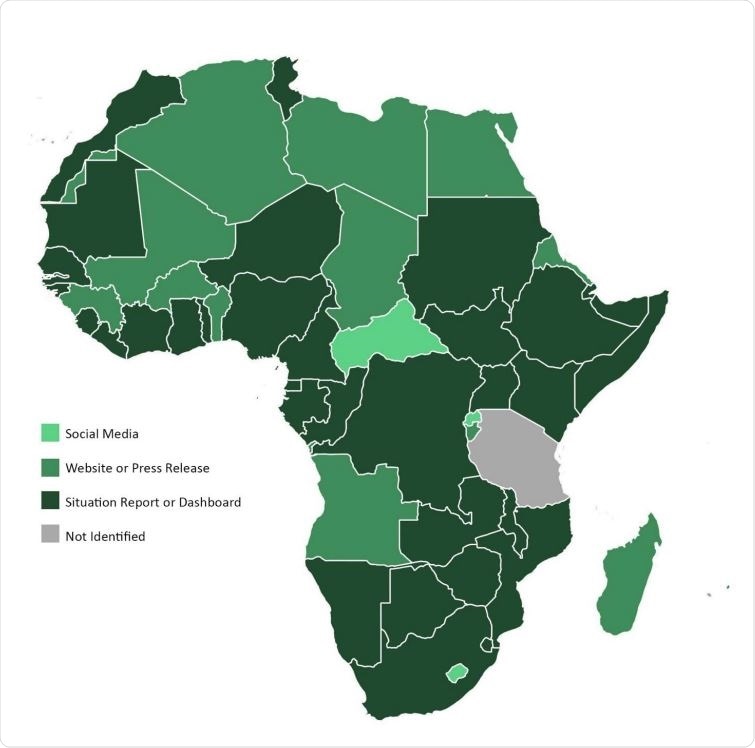An international team of scientists has recently investigated how African countries report and share data related to the Coronavirus disease 2019 (COVID-19) pandemic. They have found that African countries use distinct reporting systems that include social media posts, website updates, situation reports, press releases, and online dashboards. A detailed report of the findings is currently available on the medRxiv* preprint server.
For better pandemic management, accurate reporting and public access to COVID-19 data is crucial. An optimal reporting system should include the actual number of COVID-19 cases, patient demographics, comorbidities, epidemiological risk factors, testing practices, and healthcare capacities. However, a significant variation in COVID-19 reporting systems has been observed between countries across the globe. This could severely impact the pandemic-related risk management and national/international decision-making and policymaking at the global level.
A lower-than-expected infection and mortality rate was observed in African countries at the beginning of the pandemic. However, the continent has faced major outbreaks of more infectious variants of severe acute respiratory syndrome coronavirus 2 (SARS-CoV-2) during the later phase of the pandemic. To control the pandemic trajectory, African public health authorities have modified and improved COVID-19 reporting systems both at the national- and continental levels.
In the current study, the scientists have examined digital reporting of COVID-19 cases, risk factors, and healthcare capacity in 54 African countries to gain more insight into future pandemic response and preparedness.

National COVID-19 data reporting systems in Africa African countries are depicted with identified type of national COVID-19 data reporting system. If a country used multiple reporting systems, the system with higher data quality is shown.
Important observations
The scientists identified digital reporting systems in 53 out of 54 African countries examined. Tanzania was the only country with no reporting system.
The reporting systems of 68% of countries included routine situation reports and online dashboards. Of these countries, 83% showed subnational data, 55% showed the total number of tests performed, and 53%, 39%, and 14% included information about patients’ gender, age, and comorbidities, respectively.
For COVID-19 reporting, extra-budgetary funds were used by 50% of countries. Moreover, about 69% of countries used social media for presenting COVID-19 related statistics.
Country-specific reporting systems
For further comparison, the scientists separately analyzed the digital reporting systems of five particular countries.
Cameroon
The reporting system of Cameroon included routine situation reports containing regular updates on healthcare capacity (availability of hospital beds and oxygen concentrators), testing capacity, patient comorbidities, and cases among healthcare workers. However, the COVID-19 reports of the country were less accessible by the general population. In Central Africa, other five countries, including the Democratic Republic of the Congo, Equatorial Guinea, Gabon, Republic of the Congo, and Sao Tome and Principe, also provided situation reports and online dashboards.
Egypt
Underreporting of COVID-19 cases occurred initially in Egypt. Afterward, the government started providing total cases, deaths, and recoveries on a website in Arabic. However, the reports did not include information about patients’ demographics and comorbidities. Only Tunisia, Morocco, and Sudan provided situation reports and online dashboards among other six North African countries.
Kenya
The country’s government provided high-quality reports that included testing details, healthcare capacity, patient demographics and comorbidities, the geographical distribution of cases, and the total number of hospitalizations, ICU admissions, and home isolations.
Senegal
The country’s government provided real-time COVID-19 case data through situation reports and online dashboards. In general, the majority of West African countries had high-quality reporting systems.
South Africa
The situation reports and online dashboard primarily included detailed hospital surveillance data and routine updates on COVID-19 statistics in this country. Moreover, detailed information on hospitalizations, demographics, and comorbidities of COVID-19 patients were included in the reporting system. Other South African countries with situation reports and online dashboards included Botswana, Eswatini, and Namibia.
Study significance
Overall, the study identifies a significant variation in data reporting systems across African countries, with some providing enriched, high-quality reports and some providing inadequate, infrequent, and underestimated reports.
Based on the observations, the scientists suggest that COVID-19 reporting systems should include information about demographics, comorbidities, testing, and healthcare capacity in addition to reporting cases, deaths, and recoveries. These additional details could benefit healthcare professionals, researchers, decision-makers, and the general public to better understand the pandemic.

 This news article was a review of a preliminary scientific report that had not undergone peer-review at the time of publication. Since its initial publication, the scientific report has now been peer reviewed and accepted for publication in a Scientific Journal. Links to the preliminary and peer-reviewed reports are available in the Sources section at the bottom of this article. View Sources
This news article was a review of a preliminary scientific report that had not undergone peer-review at the time of publication. Since its initial publication, the scientific report has now been peer reviewed and accepted for publication in a Scientific Journal. Links to the preliminary and peer-reviewed reports are available in the Sources section at the bottom of this article. View Sources